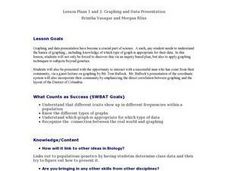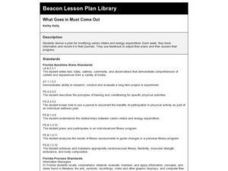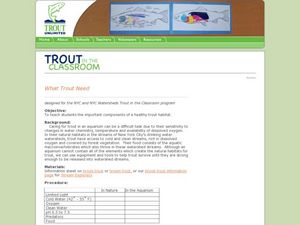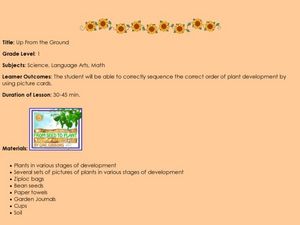Cornell University
The Making of Macromolecules
Compare and contrast macromolecules made from the same elements. Young scholars learn how the structure of a molecule has as much influence on a compound as the elements in the molecule. They experiment with molecular model kits to...
Curated OER
The Water Cycle
An inventive and interesting lesson on the water cycle (and other cycles associated with it), is here for you. After doing a well-designed hands-on inquiry in class, learners also identify organisms and processes that are involved in the...
Curated OER
# 21 Measuring Nitrate by Cadmium Reduction
Students design an experiment to evaluate the effects of various treatments on the nitrogen cycle in a freshwater aquarium. They are required to maintain a laboratory notebook of all work, measure the key analytes of the biosystem at...
Curated OER
Observing the Pumpkin Cycle
Students observe and listen to nonfiction books about the life cycle of pumpkins. They practice early reading skills in a shared reading related to pumpkins. They observe the life cycle of a pumpkin including growth and decay.
Curated OER
Seasons of Trees
Learners examine how trees change over time. In this forestry lesson, students read the book The Seasons of Arnold's Apple Tree and choose three trees to observe over a period of time. Learners record observations and seasonal changes in...
Curated OER
Moonwalking to Mars?
Learners examine a quote from George W. Bush's recent speech on space exploration. They evaluate one writer's stance on Bush's space exploration goals by reading and discussing "Plea to Policy Makers: Let's Take Another Giant Step." In...
Curated OER
The Earth's Rotation
Students see a model of a globe to watch the Earth rotate. In this Earth lesson, students rotate the globe and shine a flashlight to see where the sun shines and how it rises and sets. They create a diagram and explain day and night in...
Curated OER
Ecosystem Energizers
Fourth graders see how the flow of energy through an ecosystem made up of producers, consumers, and decomposers carries out the processes of life and that some energy dissipates as heat and is not recycled.
Curated OER
Building on the Past
Students consider how the scientific advances of the past have contributed to the science topics reported on today in the Science Times section. After reading a current science article, they compare and contrast the way science was...
Curated OER
Recycle and Respect!
Students explore how they can be a philanthropist. In this recycling lesson, students learn what it means to recycle and discuss why items need to be recycled. Students review the term philanthropy and practice this by picking up the...
Curated OER
Green Leaves
Third graders, after having conducted one experiment three times, record their observations results in a chart. They predict what hidden colors they believe that a leaf holds. Students record their predictions in their science note books...
Curated OER
How Do Cells Reproduce?
Students examine cell division and the process of mitosis. In this cell reproduction lesson students grow yeast and observe the results, and learn about the career of scientific illustration.
Curated OER
Fairy Dictionary
Use artwork to illicit responses in a writing journal, and then present your class with the short list of key terms provided. Can your learners add any of their own key terms? Segue for a second, and read tales such as Peter Pan or...
Curated OER
Making Sense of Our Senses
Students participate in activities about the five senses. They explore objects, listen to stories and discuss the senses with classmates.
Curated OER
Exploring the Hudson in 1609
While this instructional activity focuses on a study of the Hudson River, it could be used as a template for a discussion of map skills, converting measurements, and plotting a route. The instructional activity includes vocabulary and...
Curated OER
Exploring the Hudson in 1609
Learners follow the journey of Henry Hudson down the river with his name. Using journal entries and maps, they learn about its exploration. They use maps to identify stages of the journey, and practice converting distances into miles.
Curated OER
Graphing And Data Presentation
High schoolers engage in a study of science and mathematics with the practice of creating graphs. A guest speaker comes to the class to share statistics from the community and the students are shown how he uses the coordinate system in...
Curated OER
How Caves Are Formed
Students explore caves. For this cave formation lesson, students take a virtual tour of a cave and then participate in a scientific investigation that requires them to grow crystals and chart data regarding their growth.
Curated OER
The Water Cycle
First graders investigate the different stages of the water cycle. They conduct Internet research and complete a water cycle WebQuest. Students identify what happens at each stage of the water cycle, and write about each stage in their...
Curated OER
What Goes in Must Come Out
Young scholars monitor their calorie intake and energy expenditure. They keep track of daily data in a journal and assess and adjust their diets as appropriate.
Curated OER
Insect Unit
Fourth graders study the lives, and features of insects in the series of lessons that make up this unit.
Curated OER
Be the Kiwi: What is going on in New Zealand?
Young scholars study the three environmental issues facing New Zealand today. In this ecology lesson, students brainstorm some solutions to these environmental issues. They share what they have written in their journals.
Curated OER
What Trout Need
Students investigate the important components for a healthy trout habitat. In this fish habitat activity, students discuss how the aquarium will simulate a trout's environment in nature. Students complete a trout information sheet to set...
Curated OER
Up From the Ground
First graders sequence the development of a plant. In this plant life lesson, 1st graders listen to a story about how a plant grows, students view a PowerPoint presentation and learn new vocabulary. Finally, students sequence the stages...























